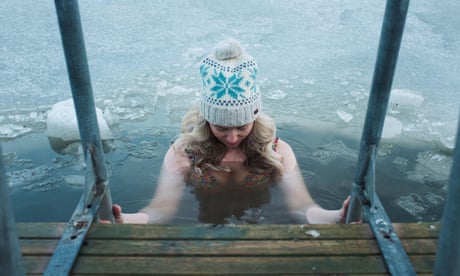The Health and Wellbeing Effects of Plunging into Icy Water: How Dangerous Is It?
Key Highlights :

The potential health and wellbeing benefits of cold water immersion have long been documented, with advocates claiming it can help with ailments from arthritis and Crohn’s disease to depression and headaches. But the death of Kellie Poole, a 39-year-old whose heart stopped during a cold water immersion therapy session in Derbyshire last year, has raised questions about the safety of plunging into icy water. So do the purported health and wellbeing benefits of cold water immersion outweigh the risks?
The cold shock response is triggered by a sudden fall in skin temperature, which causes a surge in adrenaline, noradrenaline and cortisol immediately after immersion. This feeling of alertness is often cited as a positive, invigorating experience, but a two-minute immersion is sufficient to achieve this, according to Prof Mike Tipton of the Extreme Environments Laboratory at the University of Portsmouth.
Some claim more enduring mental health benefits, which Tipton says are plausible, but mostly anecdotal at this stage. There are also suggestions of broader physical benefits to the immune system and anti-inflammatory effects. One Dutch study, with 3,000 participants, found that people who took a daily cold shower (after a warm shower) were off work with self-reported sickness 29% less than those who had a warm shower only.
But the physiological effects of the cold shock response can also be dangerous. The sudden cooling causes a sharp gasp followed by a period of uncontrolled hyperventilation, and the heart rate can increase and peripheral blood vessels can close. About 60% of cold water immersion deaths occur within the first minutes of immersion and so scientists recommend doing as little as possible – float or stand – for the first couple of minutes in the water.
A large part of the risk can be mitigated by a progressive approach to cold water immersion. The body habituates to the cold shock response, with as few as five two-minute immersions reducing the physiological response by as much as 50%, and the uninitiated are advised to start with face immersion or a cold shower before trying full immersion or an outdoor swim.
Prof Greg Whyte of Liverpool John Moores University believes the marginal evidence for health benefits of cold water immersion reflects that this is a new area of study rather than a lack of credibility. “We can be fairly secure in the fact there are health benefits – not only in terms of physical and mental health but, because it’s often a community activity, in terms of social health. But it’s always caveated by the fact that what you must do is do it safely.”
The death of Kellie Poole has highlighted the need for more regulation in cold water immersion therapy, and while the potential health benefits should not be dismissed, cold water immersion should always be undertaken with caution and with the correct safety measures in place.
